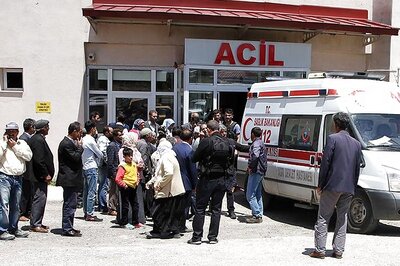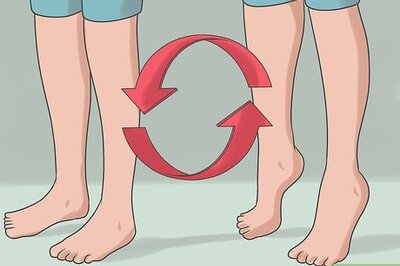
views
Sydney: Japan's economy seems to be in a state of almost suspended animation as its nuclear crisis shows no sign of ending, sorely testing analysts' hopes for a swift rebound led by reconstruction efforts.
Indeed, with trillions of yen wiped off share markets and a surging yen currency squeezing the all-important export sector, economists fear an extended slump is inevitable.
"Japan will fall into a temporal recession," wrote Susumu Kato, Credit Agricole's chief economist for Japan in a note. He expects gross domestic product (GDP) to shrink this quarter and next, making three straight quarters of contraction.
He estimated the devastating earthquake and tsunami which struck last Friday would take 0.6 percentage points from gross domestic product (GDP) growth in the first quarter and as much as 1.5 percentage points in the second.
Kato expects first quarter real GDP to fall 0.4 per cent from the previous quarter, and second quarter GDP to drop 1.2 per cent.
Even with spending on rebuilding then feeding though, the economy might show no growth at all for the fiscal 2011 year.
Kato, like many analysts, suggested the damage could amount to 15 trillion yen ($188 billion), or around 3 per cent of GDP.
While a country as rich as Japan was well able to bear the cost, it still represented a terrible loss of wealth.
"Earthquakes not only curb effective demand, through consumption and capex, but also lower potential growth through damages to tangible fixed assets and human capital," said Kyohei Morita, at Barclays Capital, in a note to clients.
Compounding the pain, losses from the quake had been far outstripped by wealth wiped out in the stock market, with over $600 billion lost at one stage on Tuesday.
Adding to concerns about the economic impact of the disaster, the yen shot to record highs on the US dollar early on Thursday, making Japan's exports less competitive when it had been counting on an export-led rebound.
Ever more careful
Also unforeseen by analysts was the sheer uncertainty generated by the crisis at the Fukushima nuclear plant and the resulting loss of power to so many factories and homes.
Millions of people have been told to stay at home because of the danger of radiation, while rolling blackouts are playing havoc with the usually super-reliable transport system.
"As consumers become even more careful and increase precautionary saving for rainy days, that will sharply weigh on consumption," said Kato at Credit Agricole.
"The managed blackout will also work in a way that will weigh on economic activities of those affected," he added.
Around 10 percent of total power capacity has been shut down and, with several reactors seemingly lost for good, the blackouts could last for months.
"Firms also face an inability to secure necessary components and raw materials," said Tom Taylor, an economist at National Australia Bank.
"The problem is worsened by the use of just-in-time inventory systems, so there is often not much in the way of stocks to draw down."
This was particularly so for autos and electronics with Nissan, Mazda, Honda, Hitachi, NEC, Fujitsu, Toyota and Sony shutting factories, he added. Toyota has shut all its 12 main car plants until at least March 22, and other car makers are no better off.
"It is hard to know how long these disruptions will persist - but they are an added factor driving down GDP," said Taylor.
Still, assuming the nuclear crisis could be contained, the resilience of the Japanese people and the boost from rebuilding should eventually make itself felt.
"Reconstruction spending will likely prove to be a very effective and justifiable fiscal stimulus," was the conclusion of ratings agency Moody's.
"Large, wealthy economies have demonstrated a capacity to absorb natural disasters," says Thomas Byrne, a Moody's senior vice president.
"And Japan's $6 trillion economy, approximately equal to Germany's and Italy's combined, is indeed large."




















Comments
0 comment